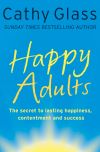Правообладателям!
Представленный фрагмент книги размещен по согласованию с распространителем легального контента ООО "ЛитРес" (не более 20% исходного текста). Если вы считаете, что размещение материала нарушает ваши или чьи-либо права, то сообщите нам об этом.Читателям!
Оплатили, но не знаете что делать дальше?
Текст бизнес-книги "Cathy Glass 3-Book Self-Help Collection"
Автор книги: Cathy Glass
Раздел: Жанр неизвестен
Текущая страница: 1 (всего у книги 1 страниц)

Contents
Cover
Title Page
Happy Kids
Happy Adults
Happy Mealtimes for Kids
Cathy Glass
Copyright
About the Publisher

Cathy Glass
Happy
Kids
The secret to raising well-behaved, contented children

Contents
Cover
Title Page
Introduction: Why?
CHAPTER ONE First Years
Baby and the 3Rs: 0–1
Toddler and the Terrible Twos: 1–3
Some Techniques
CHAPTER TWO Preschool
Rising Five: 3–5
CHAPTER THREE More Techniques
CHAPTER FOUR School
Starting School: 5–8
Big Fish in a Little Pond: 9–11
CHAPTER FIVE Factors Affecting Behaviour
Stress Factors
Siblings
CHAPTER SIX Difficult Children
Turning around a Difficult Child
Maintaining Control
Reforming Siblings
CHAPTER SEVEN Not Your Own
Step-parents
Acting Parents
Teachers
Others who Look after Children
CHAPTER EIGHT Other Factors
Diet
Special Needs
CHAPTER NINE Metamorphosis
Pre-teen and Early Teen: 11–15
Older Teen: 15–18
CHAPTER TEN Grown Up
Young Adults
Conclusion
Remember
Index
Introduction: Why?
Why another book on child rearing? The idea came from my readers. After the publication of my fostering memoirs I received thousands of emails from parents and childcare workers around the world. They sent their love and best wishes for the children I had written about, and also praised me for the way I had managed the children’s often very difficult behaviour:
I tried that method and it worked …
What a good idea …
My son used to be very controlling so I handled it as you did and (amazingly) he stopped.
I’d never thought of dealing with my daughter’s tantrums that way before …
I now talk to my children rather than at them.
You should write a book!
Their comments made me realise that the techniques I use for successfully changing children’s unacceptable behaviour were not universally known – indeed far from it. I wasn’t sure I knew what I did, only that it worked. So I began analysing how I approached guiding, disciplining and modifying children’s behaviour, the psychology that lay behind my techniques and why they worked. This book is the result.
As a parent you want the best for your child: you want them to be a happy, self-assured individual who can fit confidently into society. As a parent you are responsible for making that happen. There will be others involved in forming your child – teachers, siblings, friends, relatives, etc. – who will have some influence on your child, but ultimately your son or daughter will be the product of your parenting, good and bad.
I often feel it is a great pity that, as parents, we are not given training in the job of child rearing. No other profession would unleash an employee on a job without basic training and on-going monitoring, but when we become parents, the baby is put into our arms and, apart from a few words of encouragement from a kindly midwife and weekly trips to the clinic to weigh the baby, we’re left to get on with it. We’re supposed to know what to do, having somehow absorbed along the way the contents of volumes of baby and child-rearing manuals, and the accumulated knowledge of a century of child psychologists. The most important job in the world is left to ‘instinct', without a single course on the techniques of child rearing. Little wonder we quickly feel inadequate when baby doesn’t do as expected. And why should he? He relies solely on us, and yet we don’t always know what to do.
Unlike parents, as a foster carer I receive regular training in all aspects of child development, including teaching children how to behave correctly. My 3Rs technique is based on this training and on years and years of experience – I’ve had plenty of children to practise on during my fostering career! The 3Rs are Request, Repeat and Reassure. The technique is incredibly easy and successful, and can be applied to all ages.
If you have older children, I suggest you still start at the beginning of this book. Read about the 3Rs in relation to the early years, where I explain the basis of the technique, so that you can see where its roots lie and learn the principles. Once you know these, you can use the 3Rs with children of any age to bring them up to be contented and well behaved.
The 3Rs = success.
Note: the term ‘parent’ as used in this book includes the person who performs that role and is the child’s main care-giver.
Внимание! Это ознакомительный фрагмент книги.
Если начало книги вам понравилось, то полную версию можно приобрести у нашего партнёра - распространителя легального контента ООО "ЛитРес".Правообладателям!
Представленный фрагмент книги размещен по согласованию с распространителем легального контента ООО "ЛитРес" (не более 20% исходного текста). Если вы считаете, что размещение материала нарушает ваши или чьи-либо права, то сообщите нам об этом.Читателям!
Оплатили, но не знаете что делать дальше?







